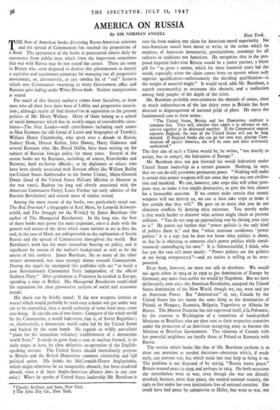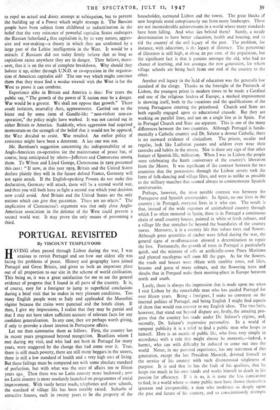AMERICA ON RUSSIA SIR NORMAN ANGELL
By
THE flow of American books discussing Russo-American relations and the spread of Communism has reached the proportions of a flood. The appearance of the books is punctuated almost daily by statements from public men which leave the impression sometimes that war with Russia may be just round the corner. There are some in Britain who seem disposed to dismiss this phenomenon as merely a capitalist and reactionary campaign for stamping out all progressive movements, or, alternatively, as just another bit of " red " hysteria which sees Communists swarming in every Government office and Russian spies hiding under White House beds. Neither interpretation is sound.
For much of this literary outburst comes from Socialists, or from men who all their lives have been of Leftist and progressive associa- tion ; although nearly all find themselves in opposition to the present policies of Mr. Henry Wallace. Many of them belong to a school of social democracy which has its weekly organ of considerable circu- lation—The New Leader—with contributors including such names as Max Eastman (an old friend of Lenin and biographer of Trotsky), William Henry Chamberlin, who spent over a decade in Russia, Sydney Hook, Horace Kallen, John Dewey, Harry Gideonse and several Russians who, like David Dallin, have been writing on the subject- of Russian foreign policy for many years. Several of the recent books are by Russians, including, of course, Kravchenko and Barmine, both ex-Soviet officials ; or by diplomats or others who have been closely associated with Russian affairs like William Bullitt (ex-United States Ambassador to the Soviet Union), Major-General Deane (head of the United States Military Mission in Moscow in the war years), Budenz (so long and closely associated with the American Communist Party), Louis Fischer (an early admirer of the Russian Revolution) and several more of similar record.
Among the more recent of the books, two particularly stand out. The Red Prussian,* a biography of Karl Marx, by Leopold Schwarz- schild, and The Struggle for the World,f by James Burnham (the author of The Managerial Revolution). In the long run, the first of these books may prove the more important, since it deals with the genesis and nature of the ideas which cause nations to act as they do, and, in the case of Marx, are indispensable to the explanation of Soviet Russia and the spread of Communism throughout the world. But Burnham's work has the more immediate bearing on policy, and is significant by reason of the author's background as well as by the merits of this analysis. James Burnham, like so many of the other writers mentioned, was once strongly drawn towards Communism. During the 1930's he attempted (his publisher tells us) " to build a new Revolutionary Communist Party independent of the official Stalinist Party." After graduation at Princeton he studied in Europe, spending a •time at Balliol. His Managerial Revolution established his reputation for clear provocative analysis of social and economic trends.
His thesis can be briefly stated : If the new weapons (atomic or worse) which would probably b: used once a major war got under way are to be controlled, then a world authority of some kind must come into being. It can take one of two forms : Conquest of the whole world by the Communists, a world federation, that is, of Soviet Republics ; or, alternatively, a democratic world order led by the United States and backed by the atom bomb. He regards as wildly unrealistic " plans for the immediate voluntary establishment of a democratic world State." It needs to grow from a core or nucleus formed, in its early stages at least, by close defensive co-operation of the English- speaking nations: The United States should immediately propose to Britain and the British Dominions common citizenship and full political union. (He thinks the McCormick-Hearst Anglophobia, which might otherwise be an insuperable obstacle, has been rendered absurd, since a de facto Anglo-American alliance does in any case exist.) When he speaks of United States leadership Mr. Burnham is
* Charles Scribner and Sons, New York. t The John Day Co., New York. New York. very far from making any claim for American moral superiority. No non-American would have dared to write, in the terms which he employs, of American immaturity, provincialism, contempt for all cultures or traditions not American. He recognises that in the pro- posed imperial federation Britain would be a junior partner, a bitter pill for " so great a nation, which for three hundred years -led the world, especially when the claim comes from an upstart whose only superior qualification—unfortunately the deciding qualification—is the weight of material might" It would need, adds Mr. Burnham, a superb statesmanship to overcome this obstacle, and a realisation among both peoples of the depth of the crisis.
Mr. Burnham probably over-estimates the obstacle of status, since so much indoctrination of the last thirty years in Britain has been directed at disparagement of national pride of place. He states the fundamental case in these terms : " The United States, Britain and her Dominions confront a common fate. They will, whether they admit it in advance or not, survive together or be destroyed together. If the Communist empire captures England, the turn of the United States will not be long delayed. If England thinks she can go her own way, playing Com- munism off against America, she will be soon and most grievously undeceived."
The first aim of such a Union would be, he writes, " not merely to accept, but to compel, the federation of Europe."
Mr. Burnham does not put forward his world federation under United States leadership as a certain panacea. Nothing, he says, that we can do will guarantee permanent peace. " Nothing will make it certain that atomic weapons will not some day wipe out our civilisa- tion and mankind. We can, however, take steps that will either post- pone war, or make it less totally destructive, or give the best chance for a favourable outcome. If we cannot make certain that atomic weapons will not destroy us, we can at least take steps to make it less certain that they will." He goes on to insist that you do not eliminate conflicts by denying their existence. You merely make it that much harder to discover what actions might check or prevent collision. " You do not stop an approaching war by closing your eyes to it." He points out further that " power politics is the only kind of politics there is," and that " when someone condemns ' power politics' it is a sign that he does not know what politics is about, or that he is objecting to someone else's power politics while simul- taneously camouflaging his own." It is Schwarzschild, I think, who has put the case still more neatly : " Power politics are the politics of not being overpowered "—and no nation is willing to be over- powered.
Even there, however, we must not talk in absolutes. We would not agree either in 1914 or in 1939 to the domination of Europe by Germany, any more than earlier we would by Napoleon. But we have deliberately, ever since the American Revolution, accepted the United States domination of the New World, though we, too, were and are an American Power. But " domination " of, say, Canada by the United States has not meant the same thing as the domination of Poland, or Hungary, Rumania, Bulgaria, Yugoslavia or Albania by
Russia. The Monroe Doctrine has not expressed itself, a la Polonaise, by the creation in Washington of a committee of hand-picked
Mexicans or Brazilians who are then sent to their respective countries under the protection of an American occupying army to become the Mexican or Brazilian Government. The relations of Canada with her powerful neighbour are hardly those of Poland or Rumania with Russia.
The service which books like that of Mr. Burnham perform is to draw our attention to needed decisions—decisions which, if made early, can prevent war, but which made late may help to bring it on. The 'problem is not disposed of by saying, " Russia wants peace." Britain wanted peace in 1939, and perhaps in 1914. On both occasions she nevertheless went to war, even though she was not directly attacked, because, more than peace, she wanted national security, the right to live under her own institutions free of external coercion. She could have had peace by submission to Hitler, but went to war, not
to repel an actual and direct attempt at subjugation, but to prevent the building up of a Power which might attempt it. The Russian people have been subject from childhood to indoctrination in the belief that the very existence of powerful capitalist States endangers the Russian fatherland ; that capitalism is, by its very nature, aggres- sive and war-making—a theory in which they are confirmed by a large part of the Leftist intelligentsia in the West. It would be a miracle if Russians did not today firmly believe that so long as capitalism exists anywhere they are in danger. They believe, more- . over, that it is on the eve of complete breakdown. Why should they bolster it up, either through U.N.O. or co-operation in the organisa- tion of American capitalist aid? The one way which might convince them that they must find a modus vivendi with the West is for the West to prove it can combine.
Experience alike in Britain and America is this: For years the public say, " The growth of the power of X nation may be a danger. War would be a greater. We shall not oppose that growth." There result isolation, neutrality Acts, appeasements. Carried out to the bitter end by some form of Gandhi-like " non-violent non-co- operation," the policy might have worked. It was not carried out in either Britain or America. Suddenly, when aggression had acquired. momentum on the strength of the belief that it would not be opposed, the West decided to resist. War resulted. An earlier policy of resistance might have been a deterrent. A late one was not.
Mr. Burnham's suggestion concerning the indispensability of an Anglo-American co-operation for the maintenance of peace has, of course, beep anticipated by others—Jefferson and Clamenceau among them. To Wilson and Lloyd George, Clemenceau in 1919 presented this case: " If now, in this year 1919, Britain and the United States declare plainly they will in the future defend France, Germany will not again attack. If the English-speaking Powers do not make this declaration, Germany will attack, there will be a second world war, and then you will both have to fight a second war which your decision now could avoid. And Britain and the United States are the only nations which can give that guarantee. There are no others." The implication of Clemenceau's argument was that only close Anglo- American association in the defence of the West could prevent a second world war. It may prove the only means of preventing a third.



































 Previous page
Previous page